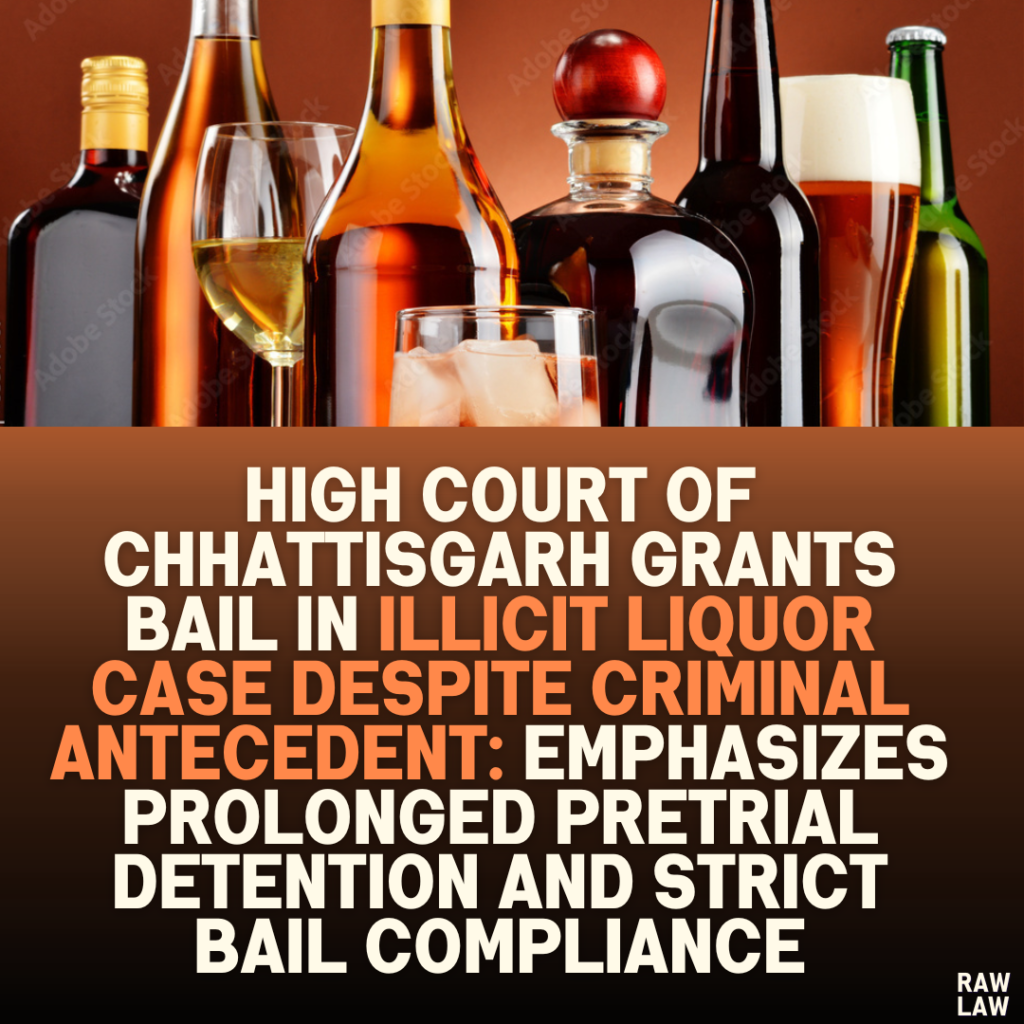Court’s Decision
The High Court of Chhattisgarh allowed the first bail application of the applicant, arrested for an offence under Section 34(2) of the CG Excise Act. The court emphasized that the applicant has already been in custody for over three months, and the trial is likely to take considerable time to conclude. Considering that the applicant had only one pending criminal antecedent and a charge sheet had been filed, the court deemed it appropriate to release him on bail with stringent conditions to ensure his presence and prevent any misuse of bail liberty.
Facts
- The applicant was arrested in connection with Crime No. 354/2024, registered at Police Station Basantpur, District Rajnandgaon.
- The police seized 44.820 liters of illicit liquor based on secret information, alleging it was in the applicant’s possession.
- Following the seizure, the applicant was arrested, and a case was registered under Section 34(2) of the CG Excise Act.
- The applicant filed his first bail application under Section 483 of the Bharatiya Nagarik Suraksha Sanhita (BNSS), 2023.
Issues
- Entitlement to Bail: Whether the applicant, with one pending criminal antecedent and a charge sheet already filed, is entitled to bail under the circumstances.
- Prevention of Misuse of Bail: Whether granting bail with conditions can ensure the applicant’s attendance during trial and prevent further criminal activities.
- Balancing Liberty and Legal Process: Whether prolonged detention without trial violates the applicant’s rights.
Petitioner’s Arguments
The applicant’s counsel made the following key points:
- False Implication: The applicant has been falsely implicated, and the seized liquor was not in his exclusive possession.
- Punishment Scale: The offence under Section 34(2) of the CG Excise Act carries a minimum punishment of one year and a maximum of three years, making prolonged detention without trial disproportionate.
- Custody Duration: The applicant has been in jail since August 8, 2024, with no immediate likelihood of trial conclusion.
- Criminal Antecedent: The applicant’s only criminal antecedent under the Excise Act is still pending and does not disqualify him from bail.
Respondent’s Arguments
The State, opposing the bail application, argued:
- Recovery Evidence: The seizure of 44.820 liters of illicit liquor was directly linked to the applicant, making the case strong.
- Criminal Antecedent: The applicant has a previous criminal antecedent under the CG Excise Act, indicating a pattern of illegal behavior.
- Completion of Investigation: The charge sheet has been filed, and the trial process should proceed without granting bail to the applicant.
Analysis of the Law
The court examined the provisions under:
- Section 34(2) of the CG Excise Act: It prescribes penalties for possession of illicit liquor, with a punishment range of one to three years. The court noted that the penalty is moderate compared to heinous offences.
- Section 483 of BNSS, 2023: It governs bail applications, emphasizing the need to balance the rights of the accused with the seriousness of allegations and public safety.
- The court weighed the right to liberty against the need to ensure the trial process is not disrupted. Prolonged detention without a clear timeline for trial conclusion was deemed unjust.
Precedent Analysis
While the judgment does not cite specific precedents, it adheres to established bail principles, including:
- The accused’s right to bail when prolonged pre-trial detention is likely.
- Strict conditions to mitigate risks associated with bail.
- Ensuring justice by balancing procedural safeguards with the presumption of innocence.
Court’s Reasoning
- Custody Duration: The applicant had already been in custody for over three months since August 8, 2024. Detaining him further, especially when the trial’s conclusion is uncertain, would be unjust.
- Single Criminal Antecedent: The applicant’s only prior offence under the Excise Act is still pending and does not make him a habitual offender.
- Charge Sheet Filed: With the investigation completed and a charge sheet filed, further detention is unnecessary for procedural purposes.
- Stringent Conditions: To address concerns about misuse of bail, the court imposed conditions ensuring the applicant’s attendance and good conduct during the trial process.
Conclusion
The court allowed the bail application and directed the applicant to be released on furnishing a personal bond with two sureties. The conditions imposed include:
- The applicant must not seek adjournments when witnesses are present for evidence.
- Regular attendance at trial dates is mandatory, either personally or through counsel.
- Misuse of bail or absence during key stages may lead to revocation of bail.
- The applicant must be present during case opening, charge framing, and statement recording.
The court directed the trial court to monitor the applicant’s compliance strictly.
Implications
- Balance of Rights: The judgment underscores the importance of balancing the accused’s rights with the need for an efficient judicial process.
- Timely Trials: It highlights the issue of prolonged pre-trial detention, emphasizing that justice delayed is justice denied.
- Effective Conditions: The judgment demonstrates how strict bail conditions can mitigate risks and ensure trial participation.
This decision reinforces the judiciary’s responsibility to uphold the rights of accused individuals while ensuring that the trial process is not compromised.




Pingback: Supreme Court Acquits Appellant in Abetment of Suicide Case: “Refusal to Marry, Even if Emotionally Distressing, Does Not Amount to Abetment Under Section 306 IPC Without Evidence of Mens Rea or a Direct Act of Provocation” - Raw Law